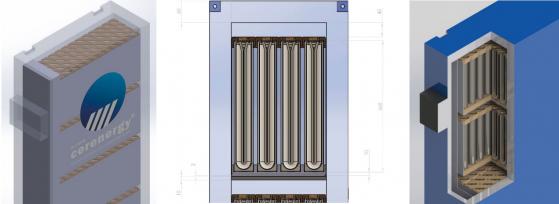
- All Instrument Types
- Indices
- Equities
- ETFs
- Funds
- Commodities
- Currencies
- Crypto
- Bonds
- Certificates
Please try another search

Altech Chemicals launches CERENERGY 60KWh battery pack design for renewable energy storage
 Altech Chemicals launches CERENERGY 60KWh battery pack design for renewable energy storage
Altech Chemicals launches CERENERGY 60KWh battery pack design for renewable energy storage
Altech Chemicals Ltd (ASX:ATC) has designed and launched its CERENERGY® ABS60 60 kilowatt-hour (KWh) sodium alumina solid-state battery pack, in collaboration with joint venture (JV) partner Fraunhofe, for distribution in the renewable energy storage market.
The company chose to launch the 60 KWh battery module instead of a proposed 10KWh module based on preliminary discussions with potential offtake partners, which favoured the 60KWh battery pack, rated with a higher voltage of 620 volts and 100 amp-hour (Ah).
The 240-cell battery module has been designed specifically for renewable energy and grid-level power storage, with a weatherproof construction built for outdoor installation and larger capacity to reduce module assembly and connection costs.
ABS60 design advantages
The ABS60 battery consists of 240 cells (rated at 2.4 volts each) arranged in four rows of 12 cells five modules high.
Cross section of the ABS60 battery pack showing cell configuration.
This battery pack measures 2.6 metres in height by 0.4 metres in length and 1-metre in width, designed for Ingress Protection (IP) 65 standard (levels of sealing effectiveness of electrical enclosures) which means that they will be dustproof and weatherproof.
The newly designed Altech ABS60 battery packs are expected to take approximately six hours to charge and discharge over a similar period, mirroring the pattern of power generation with solar.
One of the battery’s biggest advantages over lithium is its operating temperature, which ranges from -40 degrees Celsius to more than 60 degrees, ideal for cold European climates.
Its high-temperature range and fire-proof nature mean the sodium-alumina batteries can be installed in areas too dangerous for lithium batteries, which must be cooled at high temperatures and can combust when exposed to water or air.
Altech intends to design its battery plant to produce these ABS60 battery packs as a standard product.
JV partner Fraunhofer has previously estimated the batteries will be about 40% cheaper to produce than lithium-ion batteries, primarily due to the low cost of its main materials.
Related Articles
Are you sure you want to block %USER_NAME%?
By doing so, you and %USER_NAME% will not be able to see any of each other's Investing.com's posts.
%USER_NAME% was successfully added to your Block List
Since you’ve just unblocked this person, you must wait 48 hours before renewing the block.
I feel that this comment is:
Thank You!
Your report has been sent to our moderators for review






Add a Comment
We encourage you to use comments to engage with users, share your perspective and ask questions of authors and each other. However, in order to maintain the high level of discourse we’ve all come to value and expect, please keep the following criteria in mind:
Perpetrators of spam or abuse will be deleted from the site and prohibited from future registration at Investing.com’s discretion.